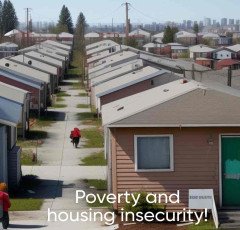
Health equity and social justice

According to the idea of "health equity," every person should have the chance to live a healthy life regardless of their social or economic standing, race, ethnicity, gender, or other traits.
It indicates that people and communities have access to the tools and opportunities needed to preserve and enhance their physical and mental health.
Contrarily, social justice is the equitable and fair allocation of resources, rights, and opportunities throughout society, regardless of an individual's identity or upbringing.
It is the understanding that some groups have historically experienced marginalization and discrimination as well as the conviction that everyone should have access to opportunities and resources on an equal basis.
Social justice and health equity are related ideas that acknowledge the intricate ways in which social, economic, and political variables affect health outcomes. In order to achieve health equity, it is important to address the underlying causes of health inequities and make sure that everyone has access to quality healthcare, secure housing, wholesome food, and other necessities. Promoting social justice entails supporting laws and procedures that uphold justice and equality, as well as measures to combat systemic prejudice and inequality. In order to build a more just and equitable society, social justice and health equity must work together.
Social justice and health equity are significant for a number of reasons. They are first and foremost basic human rights. Regardless of social or economic standing, everyone ought to have access to the tools and opportunities needed to lead a healthy life. They are also necessary to achieve the best possible results in terms of health. Poverty, racism, and prejudice are just a few examples of social and economic issues that can significantly affect health outcomes. We can enhance everyone's health results by addressing these fundamental causes.
Third, in order to create stronger and more resilient communities, social justice and health fairness are essential. People are better equipped to contribute to society, engage in the workforce, and pursue their goals and dreams when they are well and thriving. Greater economic growth and social stability may follow from this.
A more just and equitable society must prioritize social justice and health equity.
We can build a society that is more equitable and just for everyone, regardless of their identity or history, when we confront structural prejudice and inequality.
Social justice and health equity are related ideas that acknowledge the intricate ways in which social, economic, and political variables affect health outcomes. Promoting human rights, enhancing health outcomes, fostering stronger communities, and establishing a more just and equitable society all depend on achieving health equity and social justice.
To advance social justice and health equity, a number of tactics can be used. The social and economic elements that affect health outcomes are known as social and economic determinants of health, and addressing these issues is one way. Poverty, unstable housing, insufficient access to healthcare, and food insecurity are a few examples of socioeconomic determinants of health. We can enhance health outcomes and advance health equity by addressing these variables.
Promoting laws and behaviors that advance social justice is another tactic. This can include measures that support equal access to housing, work, and education as well as measures that deal with systematic inequality and discrimination. Affirmative action, anti-discrimination laws, and healthcare reform are a few examples of such initiatives.
Community involvement and participation are also necessary for social justice and health equity.
Communities should be involved in the development and execution of any initiatives or policies that have an impact on their health and wellbeing. This can aid in ensuring that policies and initiatives are successful, pertinent, and culturally appropriate.
Social justice and health equity require continual observation and assessment. In order to address health inequities and advance social justice, we must monitor health outcomes and assess development. This can be used to find areas of weakness and opportunities for growth and to guide next initiatives and policies.
In conclusion, achieving social justice and health equity are essential steps in building a more fair and just society. Addressing social determinants of health, advancing social justice-promoting policies and practices, involving communities, and continual monitoring and evaluation are all necessary for achieving health equality and social justice. Working together, we can build a society where everyone, regardless of identity or upbringing, has the chance to experience optimal health and wellbeing.
Must understand that a multi-sectoral strategy is necessary to achieve social justice and health equity.
It involves cooperation between a number of sectors, including housing, education, transportation, and work, and cannot be achieved by the healthcare sector alone. This calls for a mental shift away from focusing on the specific needs of individual patients and toward tackling the larger social and economic issues that affect health outcomes.
Addressing the structural and systemic issues that support health inequalities and inequality is necessary for achieving social justice and health equity. This may entail addressing unconscious biases and prejudices that may exist in society and institutions, as well as opposing long-standing laws and practices that have historically disadvantaged particular groups.
A dedication to gathering and analyzing health equality data is necessary to advance both social justice and health equity. This entails gathering information on the socioeconomic position, gender, and other social determinants of health, as well as tracking health outcomes and assessing the effectiveness of treatments and policies. Through targeted actions and policies, discrepancies can be identified and addressed.
A dedication to advocacy and activism is necessary to advance social justice and health fairness. In order to do this, one must support laws and practices that advance social justice and health equity and oppose laws and practices that worsen health inequalities and inequality. Additionally, it entails giving communities the power to speak up for their own health and wellbeing.
A multi-sectoral strategy, tackling structural and systemic hurdles, committing to health equality data collection and analysis, and participating in lobbying and action are all necessary for achieving health equity and social justice. Together, we can build a society that supports social justice and health fairness for all.
Should understand that social justice and health equality are dynamic, ever-evolving notions.
This necessitates a dedication to lifelong learning and context-specific adaptability to shifting social, economic, and political environments. For instance, the COVID-19 pandemic has brought attention to how specific populations, like low-income communities, communities of color, and key workers, are disproportionately affected by health inequities. It is crucial to think about how to advance health equity as we continue to confront the pandemic's effects.
Social justice and health fairness can only be attained with a global viewpoint. Health inequalities and disparities are a worldwide problem that are not confined to any one nation or area. It's crucial to think about ways to advance social justice and health equity on a global level, such as through addressing issues with healthcare access and tackling problems with the world's health.
Advancing social justice and health equity demands constant dedication and work, as well as cooperation between many groups and sectors. It entails addressing social determinants of health, advocating for socially just policies and practices, involving communities, ongoing monitoring and evaluation, removing structural and systemic barriers, committing to the collection and analysis of health equity data, and participating in activism and advocacy. Together, we can build a society that supports social justice and health equity for all people, both locally and globally.
should recognize that achieving social justice and health equity is a difficult process that takes time and consistent work on the part of all parties involved, including communities, governments, and healthcare providers. It necessitates a dedication to tackling both the symptoms and underlying causes of health inequalities and injustice.
Injustices and prejudice from the past and present that have influenced health inequalities and inequality must be acknowledged and addressed in order to advance social justice and health equity. This calls for an understanding of how social and cultural variables influence health outcomes as well as a commitment to tackling how systemic racism and discrimination affect health.
Focusing on empowering people and communities to speak up for their own health and well-being is essential for advancing social justice and health equity. This includes encouraging health knowledge and self-efficacy, as well as making sure people have the tools and support they need to decide on their own health.
A continuous commitment to tackling the underlying causes of health inequalities and inequality is necessary for promoting health equity and social justice, which is a long-term and difficult process. Empowering people and communities, addressing historical and current injustices and prejudice, and advancing health knowledge and self-efficacy are all part of it. We can build a society that supports social justice and health equity for all by cooperating and dedicating ourselves to this process.
It is important to remember that achieving social justice and health fairness goes beyond just having a moral obligation.
Economic consequences associated with health inequities and inequality include lost productivity, higher healthcare expenses, and slower economic growth. We can enhance health outcomes for all people and communities while fostering social justice and equity through advancing health equity.
In order to advance social justice and health equity, one must embrace intersectionality, which acknowledges that people react to inequality and health inequalities differently depending on their social identities and life experiences. To achieve this, it is necessary to confront numerous types of oppression, including racism, sexism, ableism, and homophobia, and to promote inclusive and culturally sensitive policies and practices.
It is necessary to acknowledge the significance of community participation and participatory initiatives in order to achieve social justice and health equity. This entails including communities and people in the development, implementation, and assessment of programs and policies as well as making sure that their opinions are recognized and appreciated.
A persistent commitment and effort from all stakeholders are necessary to achieve health equality and social justice, which is a complicated and comprehensive process. It entails recognizing and dealing with past and present injustices and discrimination, fostering intersectionality and inclusivity, empowering people and communities, and participating in and engaging in community conversation. We can build a more just and equitable society where everyone has the chance to experience optimal health and well-being by cooperating and dedicating ourselves to this process.
Prioritizing policy actions that address the social determinants of health—i.e., the circumstances surrounding a person's birth, development, living situation, employment, and aging—will help to achieve health equity and social justice. These determinants consist of elements including social support, housing, food security, access to healthcare, and money.
Health disparities can be decreased and health equity can be promoted with the support of policies that address these socioeconomic determinants of health. Policies that, for instance, make it easier to acquire affordable housing, enhance public transportation, and give marginalized populations access to nutritious food options can all have a good effect on health outcomes. Health equity can also be supported by legislation that tackles income inequality and supports training for both the workforce and for schooling.
Achieving social justice and health equity also requires policies that address systemic and structural obstacles like racism and discrimination.
These regulations may call for actions to combat implicit prejudice in the provision of healthcare, encourage cultural humility and competency, and broaden diversity and representation in the healthcare leadership.
Should prioritize data collection and analysis to track development toward attaining social justice and health fairness. Data on health outcomes and social determinants of health by race, ethnicity, gender, sexual orientation, and other social identities are collected as part of this process. This data can be gathered and analyzed to help us find discrepancies and monitor our progress in eradicating them.
Social determinants of health and systemic and structural impediments like racism and discrimination must be addressed in order to achieve health equity and social justice. Prioritizing data collection and analysis is also necessary to keep track on the development of health equity. We may endeavor to create a society where everyone has the chance to achieve optimal health and well-being by adopting a comprehensive strategy.
Ensuring equitable access to healthcare services is a crucial part of fostering social justice and health equity. This includes making certain that everyone has access to, and can afford, healthcare services, regardless of their socioeconomic situation or place of residence.
For underserved and marginalized groups in particular, policies and programs should be created to increase healthcare access and cost. Increased access to preventive and primary care services in underserved areas may be achieved by increased funding for public healthcare systems, increased insurance coverage for low-income people, and subsidies for these individuals.
The social determinants of health that can affect access to care and results should be addressed through policies.
For instance, addressing housing and transportation issues can make it easier for people to obtain healthcare services. Health outcomes and access to healthcare can both be improved by policies that deal with poverty and food insecurity.
Healthcare professionals and organizations should receive training on how to give patient-centered care that is culturally sensitive and to address any implicit biases that may exist. This entails creating initiatives to support patient engagement and collaborative decision-making, as well as diversity and cultural competence among healthcare workers.
Promoting health equity and social justice requires ensuring equal access to healthcare services. In addition to tackling the social determinants of health that can affect healthcare outcomes, this calls for policies and initiatives that increase healthcare access and affordability. In order to give patient-centered care that is sensitive to cultural differences and addresses hidden biases that may have an impact on healthcare delivery, it is also necessary to train healthcare professionals and institutions.
Addressing the influence of environmental factors on health outcomes is a crucial part of fostering social justice and health equity.
Environmental variables can significantly affect health outcomes and can worsen health disparities. Examples include air and water pollution, exposure to dangerous chemicals, and climate change.
Policies should be created to promote environmental justice and guarantee that all people and communities have access to safe and healthy settings in order to address the influence of environmental factors on health outcomes. This may entail taking steps to control hazardous waste disposal and industrial emissions, as well as enforcing standards for clean air and water and supporting ecologically sound policies and practices.
To create policies and initiatives that address the disproportionate effect that environmental factors have on impoverished and marginalized communities. In order to do this, it is important to address environmental racism and prejudice and give vulnerable groups' needs top priority in environmental policy and decision-making processes.
Addressing the influence of environmental factors on health outcomes should place a priority on community engagement and participatory techniques. This entails involving communities and people in the creation and execution of environmental policies and initiatives and making sure that their opinions and views are respected.
Promoting health equality and social justice requires addressing the influence of environmental factors on health outcomes. To achieve this, we need laws and initiatives that support environmental justice, guarantee access to safe and healthy settings, and address the disproportionate effects of environmental issues on underserved and vulnerable people. To guarantee that environmental policies and programs are inclusive and culturally sensitive, it also necessitates community engagement and participatory techniques.















 SEO Checklist
SEO Checklist  All Wireless Products
All Wireless Products  Best Robotic Vacuum Cleaners
Best Robotic Vacuum Cleaners  NordVPN
NordVPN  Online Marketing
Online Marketing  Online Technology Classes
Online Technology Classes  Unreal Engine 5 For Beginners Learn The Basics Of Virtual Production
Unreal Engine 5 For Beginners Learn The Basics Of Virtual Production  Top Rated From Amazon
Top Rated From Amazon  Hello Theme
Hello Theme  Artificial Intelligence
Artificial Intelligence  Best Selling Books
Best Selling Books  Best Home Appliances
Best Home Appliances  Best Sellers On Amazon
Best Sellers On Amazon  Unlimited access to classes on illustration, photography, design, film, music
Unlimited access to classes on illustration, photography, design, film, music  Hot Bags For Pain Relief
Hot Bags For Pain Relief  One World Collection
One World Collection  ELECTRONIC ACCESSORIES
ELECTRONIC ACCESSORIES  NordPass
NordPass  SOFAS
SOFAS  NordLocker
NordLocker  Men Clothing
Men Clothing  ASPINAL LONDON
ASPINAL LONDON  The Secret Email System
The Secret Email System  Acer Laptop
Acer Laptop  Amazon Best Selling Products
Amazon Best Selling Products  BEST SELLER TOP10
BEST SELLER TOP10  TitTok Revolution
TitTok Revolution  1150+Trendy kids coloring pages Bundle
1150+Trendy kids coloring pages Bundle  Smart Doorbell
Smart Doorbell  Sennheiser
Sennheiser  Graphics & Design
Graphics & Design  Women Fashion
Women Fashion  The Click Engine
The Click Engine  Only For The United States
Only For The United States  Favorite Company (Cuelinks)
Favorite Company (Cuelinks)  Creative Brief For Video Shoot
Creative Brief For Video Shoot  ASUS Laptop
ASUS Laptop  RPM 3.0
RPM 3.0 
















